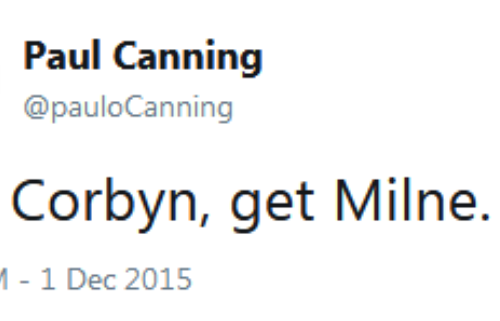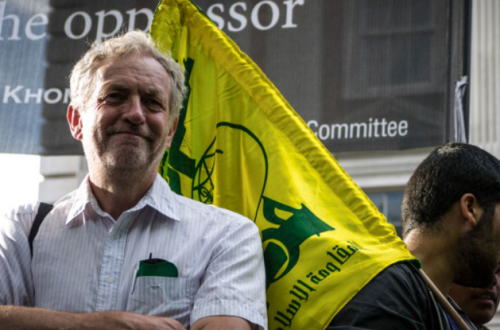This is a cross-post by James Snell
I did not, sadly, have time to include in this essay anything about the newly-emerged Russia Today interview in which Jeremy Corbyn compares ISIS and the Americans and suggests that we negotiate with the former. But it does confirm my thesis entirely, and it should serve as yet another example of this most pernicious of political poses.
Many hundreds of British citizens – most of them young men, but a significant number among them women, young children and even the elderly – have left these islands with the intention of joining the Islamic State of Iraq and Syria (ISIS). The motivations and stories of these individuals and their tragic desire to reject civilisation are all well known, but there are other British apologists for tyranny and terror – and they are afforded a great deal more in respect and status than those who travel halfway across the world to fight for and serve in the fascistic theocracy establishing itself in the Levant.
These respectable apologists for terror are often allies of both the extreme left and some of the most reactionary forces in Britain today; this unhappy situation includes almost theocratic Islamist groups such as CAGE, a now-notorious advocacy organisation which – in the course of apparently protecting the rights of prisoners – agitates on behalf of those who support the restoration of the Caliphate. Its research director, Asim Qureshi, referred to Mohammed Emwazi – infamous as the masked murderer ‘Jihadi John’ – as a ‘beautiful man’, before blaming the British government for his propensity to butcher innocent journalists and aid workers on camera.
British politicians who fall into this category include George Galloway, the former Respect Party MP for Bradford West, and Jeremy Corbyn, who is an unlikely but popular candidate in contention for the leadership of the Labour Party. They have attained dangerous prominence of late.
While British politics, exhibiting a trait common to European sensibilities, leans further to the left than America in foreign policy – indeed, the House of Commons voted unilaterally to recognise the state of Palestine alongside Israel in 2014 – Corbyn and Galloway and their fellow travellers represent a fringe of even those who share this sentiment. They are explicit allies of the terrorists and the tyrants who disfigure the modern Middle East – and they compound the injury in being dispiritingly proud of the fact.
Galloway especially has form in this, having in the past appeared alongside Saddam Hussein. On one occasion the former Bradford MP praised his ‘courage, strength and indefatigability’. Saddam’s wickedness needs no introduction, but it is perhaps pertinent to mention that he committed many acts of genocide during his brutal rule; the mass graves are still being discovered. Galloway must have known this, yet he persisted in his overt support for this monstrous figure. The same courtesy has been extended to the Syrian tyrant Bashar al-Assad, for example when Galloway called Assad’s Syria – a benighted nation, and one which has been largely abandoned by the international community – the ‘last castle of Arab dignity’. On another occasion Galloway appeared at Damascus University personally to defend the dictator.
Actions such as these are unconscionable for many reasons. Chief among them is the obvious fact that Assad is and has been the autocratic ruler of a captive state for over a decade; Saddam likewise. And this is hardly a new development; Assad’s father subjugated Syrians in a similar fashion, and was notorious for putting down any manifestation of opposition with overwhelming force.
Another distressing element of this state of events is the nature of both Assad’s and Saddam’s modus operandi. Both utilised sectarian and religious fault-lines in the pursuit of power through the strategy of divide and rule. And neither – this is especially important – were or are in any way ‘secular’. This term has been used – often idly – by those who wish to defend these tyrannical figures, but nothing could be further from the truth. Saddam instituted a ‘faith campaign’ in which he effectively Islamised his regime, sowing the seeds for future theocratic militancy in the aftermath of the 2003 Coalition invasion of Iraq. Much of what is now ISIS owes some of its status and influence to former members of Saddam’s regime, many of whom fight on its frontlines as true believers. And ISIS has also been greatly assisted by the Assad tyranny, too. It sells oil to the so-called ‘Caliphate’, and regime troops are notably reticent to fight ISIS in a meaningful sense.
Other instances of this kind of behaviour are legion: Galloway fronts TV shows with both RT and Press TV – propaganda channels owned by the Russian and Iranian governments respectively – which I would argue indicates his sensibilities more eloquently than many a critic. There he advances conspiracy theories, one of which states that the chemical weapons attack on Ghouta in August 2013 – a war crime which almost precipitated military intervention against the Assad regime from Western powers – was carried out by the rebels themselves with materiel supplied by Israel. He has also personally given money to Hamas, an organisation which openly calls for the abolition of Israel and the extirpation of its citizens.
Galloway also exhibits many unpleasant traits irrespective of his political views. He is very happy to resort to the libel lawyers when he believes himself to have been slighted, a strategy which can be distressingly effective in silencing critics. The editor of a small conservative magazine warned me off writing about him; his rationale for doing so was chilling to hear: ‘we don’t have the pockets to defend ourselves’, he said. (This situation is exacerbated by the fact that, in the editor’s words, ‘[t]he truth is a not a defence against libel in British courts’.)
Corbyn, who, when challenged on television to defend his description of Hamas and Hezbollah – those internationally condemned terrorist groups of a theocratic bent – as his ‘friends’, weakly suggested that he did so in order to create dialogue and then lost his temper. He has failed to address the fact of Hezbollah’s alliance with Assad, and nor has he ever truly dealt with Hamas’s Covenant, with its flagrantly anti-Semitic citing of the Protocols of the Elders of Zion and its call to wipe Israel off the map. A spate of recent polling suggests that he could comfortably win the Labour leadership election, thereby becoming Leader of the Opposition and a possible future Prime Minister. Such talk is not idle, and neither is the threat he could pose if he achieves office.
This all being common knowledge, these men and their ideological fellow-travellers must be either ill-informed or indifferent to the causes they claim to champion. Instead of standing up for the oppressed or those victimised by imperialism and capitalism and the West, Galloway and Corbyn and those like them attach themselves uncritically to some immensely undesirable characters. This intervention does not help those it is meant to support; rather, it assists those who, like Hamas, pose as the saviour while secretly acting as immorally as they who are the declared oppressors, if not more so.
British politics is in turmoil. After an election which created a highly surprising majority for the Conservative Party, the left is now in a position of great strain. There are many – Corbyn and Galloway among them – who say that Britain’s leftist parties must become more radical in order to win again. Among these suggestions lurks the possibility of what is effectively co-operation with and even endorsement of some of the nastiest actors in the Middle East. To reject this siren song is essential, not only for the future of the British left, but also for those in that region who have faced theocracy, fascism and tyranny, which is often supported – tacitly or explicitly – by European left-wingers. This must cease and the agents of this terrible accommodation must be prevented from gaining political prominence. Only then can the British left begin to salvage its reputation both at home and in the international arena.


